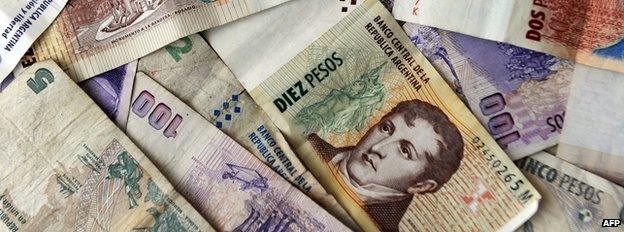Why eurozone should monitor US Supreme Court decision on Argentina
- Published
- comments

What the US Supreme Court decides in a key court case involving Argentina and its bondholders will greatly impact how sovereign debt restructuring is done in the future.
The essence of the decade-long lawsuit between the country and a handful of its creditors is: Can bondholders demand full repayment of what they lent to a country even when others have settled for a haircut?
Argentina's 2002 default of around $100bn (£61bn) was the largest at the time, until Greece's around 200bn euros debt restructuring.
What the US Supreme Court decides could have bearing on the question of so-called "hold-outs".
In 2005 and 2010, 92% of Argentina's bondholders accepted around 30% repayment in two debt exchanges.
But not two hedge funds, NML Capital and Aurelius, who are demanding 100% repayment of their $1.3bn lent to the country.
Argentina's position is that these creditors won't be paid at all since they refused to participate in the debt exchanges.
But an influential US appeals court ruled that Argentina cannot just pay the ones that accepted the debt restructuring, but must repay all of its creditors, including the hold-outs.
If it doesn't, then it opens the possibility of a technical default by the country.
Argentina is expected to petition the US Supreme Court to hear this case in the coming weeks before a February deadline.
This issue is proceeding in part to the highest court in the US, since the Supreme Court has agreed to hear a narrower case about whether two banks have to reveal information about Argentina's assets to its creditors, NML Capital and Aurelius.
Eurozone impact
So, what does this have to do with the eurozone?
Most sovereign bonds are issued under New York or English law, and Argentina's has a so-called pari passu clause, which mandates equal treatment of all bondholders.
So, what the Supreme Court decides, and whether the influential second circuit case stands, will greatly impact how sovereign debt restructuring is done in the future.
This was the view of the International Monetary Fund when the lower court decision came out last year.
In 2012, Greece's debt restructuring wasn't just the largest on record, but also the first by an European country since World War Two.
Some of its bonds were issued under English law and have pari passu clauses.
Most of the large bondholders at the time of Greece's debt restructuring two years ago accepted a "haircut" of around 75% except for 6.6bn euros of bonds held by hold-outs.
These were subsequently, and perhaps surprisingly, paid in full by the Greek government, ostensibly to avoid the type of lawsuits faced by Argentina.
But, it also set a precedent that could make future debt restructuring difficult, since bondholders may be less inclined to take just 25 cents on the euro if they know that holdouts will be paid in full.
Blanket cover?
To try and address this, the eurozone has imposed so-called collective action clauses (CACs) in new issues of euro zone government debt.
It reduces the likelihood of holdouts since a majority of bondholders will be able to accept a debt restructuring and impose it on the remaining creditors.
These came into effect last January and it's estimated that they will be the majority of eurozone bonds by 2020. But, even then, there will be bonds that don't have CACs and of course there's also those pari passu clauses to consider.
Most of Greece's bonds didn't have those clauses. In other words, some creditors like the European Central Bank can be accorded special treatment, which arguably helped politically - since the central bank likely didn't take losses like private creditors.
But, there was a minority of Greek bondholders that did, since such clauses tend to exist for bonds governed by English or Swiss law.
It means that bondholders seeking better protection against enforced losses would do better to seek out the protection of foreign laws. It is what happened in Russia during its 1998 default, when it forced losses on holders of bonds issued under Russian law but serviced in full those governed by English law.
Voluntary restructuring?
There are other complications as to whether a debt restructuring can really be "voluntary" if the alternative is no payment at all.
Whether it's voluntary or not matters since it could trigger payout on credit default swaps (CDS), which act as a form of insurance against government default.
It would constitute a technical default and have the impact as if debt was not paid, which tends to make a country a pariah on international bond markets for years. It's essentially what every country seeks to avoid.
This brings us back to why the US Supreme Court decision will be closely watched.
If the second circuit case is heard and upheld, then Argentina case makes it harder to undertake sovereign debt restructuring.
For several eurozone and other countries with "debt overhang" above what the IMF says is a critical level of exceeding 100% of GDP, it limits their options considerably.
So, what Argentina and two hedge funds do in the US could change the landscape of the global bond market, and the options for the eurozone still struggling to fashion institutional solutions to shore up the single currency.